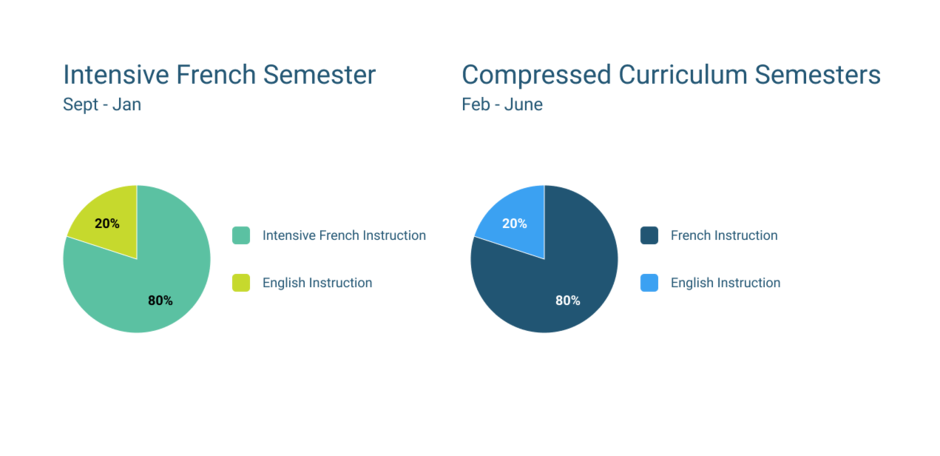What Exactly is Intensive French?
Intensive French (IF) is a second language teaching approach in which French is taught intensively for most of the day for five months during Grade 6. The students in the program receive about 80% of their instruction in French during the first half of the year and 20% during the second half; the rest of the curriculum (except for Mathematics) is “compressed” into the second half of the year.
The key ingredients for IF success are:
- Intensity of French instruction: Students and teacher speak only French during the first half of the year (80% of the day). The focus is on learning to communicate in French and not on other content learning in particular. To this end, students focus on topics that are grouped into relevant and engaging themes. Real-life projects within these themes help students to see the practical value of what they are learning. Instruction concentrates on the oral as well as the writing and reading skills.
- Time of concentrated exposure: It has been shown that the most efficient way to learn another language is to spend concentrated time with it. Higher results are achieved with 60 hours concentrated into three weeks with four hours a day, than with 60 hours spread over three months with one hour a day, even though the number of hours is the same.
- Enriched communicative FSL methodology: In order to make optimum use of the increased time of French, an enriched curriculum is required. This enrichment is provided through expanding the content of the curriculum, increasing the depth of exploration of topics and adopting a whole language approach to the teaching of French. The curriculum is cognitively demanding and increases in complexity of language use, tasks and knowledge base during the five months. It integrates some information from other subject areas, such as Science (environmental issues), Social Studies (Canadian and world geography, Canadian and world history), and Health (rules for good nutrition).
- Interactive pedagogy: Regular use of an interactive pedagogy, such as cooperative learning (working in pairs and small groups) and project-based learning is an essential part of IF. Projects permit students to use language in many different contexts, enabling them to use more types of language functions (explaining, gathering information, asking questions, negotiating meaning) as well as integrating knowledge from different sources using complex language structures. It contributes significantly to the development of cognitive, social and personal capacities as well as the organizational skills of the learner.
What is the Difference?
Elementary Core French: is a basic second language program intended to enable students to communicate purposefully in French and develop an openness to cultural diversity. The program is available in elementary schools at the Grade 5 – 7 level offering approximately 100 minutes of instruction per week. Students in Core French have the option of taking French as second language courses throughout secondary programming.
Intensive French: is an intensive French language acquisition program involving a period of intensive exposure to French (80% of one half of the Grade 6 year and 20% for the remaining half). The program continues with strong French instruction in the following years. During their Grade 7 year, students will be grouped in the same cohort of students for concentrated French Language programming. Students in the IF program are able to access French second languages courses in secondary school.
French Immersion: is an intensive French language acquisition program with the goal of developing functionally bilingual students through teaching most of the curriculum with French as the language of instruction. The program is offered beginning in Kindergarten (Early French Immersion) or in Grade 6 (Late French Immersion). Students who successfully complete French Immersion graduate with a dual language diploma and take French Immersion courses throughout secondary school programming.
Registration
Intensive French registration for the 2024-25 school year is now closed. Registration for the 2025-26 school year will open on in February and close on March 12, 2025 at NOON.
Families will receive letters in the mail over spring break indicating the status of their application.
The registration window for the Intensive French 2025-2026 school year is now CLOSED. If you would like your student to be added to the waitlist, please contact McKim Middle School.
_____
Intensive French Registration in the Kimberley Zone is now open for the 2025-2026 school year and will close on March 12, 2025 at NOON.
Intensive French Letter to Parents - Kimberley Zone 2025-2026
Intensive French Information Package - Kimberley Zone 2025-2026
Registration Form: Intensive French - Kimberley Zone 2025-2026
Parents are invited to an information meeting scheduled for Tuesday, March 5th at 5:30 pm at McKim Middle School. The parent meeting is designed to provide more information and to give you the opportunity to ask questions.
The registration window for the Intensive French 2025-2026 school year is now CLOSED. If you would like your student to be added to the waitlist, please contact J.A. Laird Elementary School
________
Intensive French Letter to Parents - Windermere Zone 2025-2026
Intensive French Parent Information Package - Windermere Zone 2025-2026
Registration Form: Intensive French - Windemere Zone 2025-2026
Intensive French Registration for the 2025-2026 school year in the Windermere Zone will open on February 17th, 2025 and close on March 12th, 2025 at NOON.
A parent information session will be held at J.A. Laird Elementary School on Tuesday February 25th, 2025 at 6:00pm in the library. The parent meeting is designed to provide more information and to give you the opportunity to ask questions.
